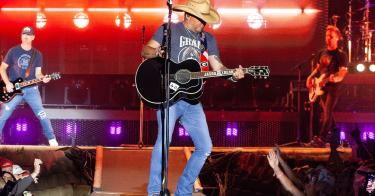Taylor Swift may be the hottest ticket this summer, but her listeners don’t share her country roots. That space has been captured by a series of anthems singing the blue-collar blues, songs that are a lot closer to—and a lot more correct—about what is bugging everyday Americans.
American music has always been an echo chamber for popular culture. The Jazz Age was a rebellious response to the high-brow Victorian Gilded Age. Rock ’n’ roll was the rallying cry of baby boomers.
Then, of course, interspersed with the angst of American protests were languid spans of crass consumerism, music for people who didn’t care about paying their bills, feeding their kids, or protecting their freedom. When we aren’t worried about making ends meet, Americans love pop music made by performers as diverse as Perry Como, Bobby Darin, Barry Manilow—and yeah, Swift.
But take note: When listeners switch from cotton candy tunes to meat-and-potatoes music, pay attention. That’s a sign America is changing.
Country music has long been a place for spawning outlaws and rebels, from Elvis Presley on. To be fair, even the Dixie Chicks (now just the Chicks) were following in that tradition in their protests against the Iraq War with their song “Not Ready to Back Down” in 2006. Sure, they generated lots of controversy, including the mass destruction of their CDs and being dropped by country radio stations, but hey—that’s what protest movements are all about.
So, it’s not too much of a surprise that a new generation of protest songs—the heirs apparent to Barry McGuire’s “Eve of Destruction” (1965)—sound nothing like a Swift pop ballad about her most recent boyfriend—and that they sound an awful lot like country music.
That’s not to say that Nashville has not gone as woke as the rest of the entertainment industry. In 2020, country icon Dolly Parton quickly backtracked from proclaiming “all lives matter” when she realized she had offended the radical Left, quickly embracing Black Lives Matter. Folk Ally, a popular online radio station that features country, folk, and Americana music, felt compelled to celebrate “Pride Month” by featuring LGBTQ artists.
Still, despite the peer, political, and commercial pressure to go with the flow, there are deep roots in country music that just won’t let go of that connection to common people. In 2021, when Blake Shelton got attacked for penning a song titled “Minimum Wage,” he basically told his critics to buzz off. “He called the backlash over the lyrics ‘absolutely ridiculous,’” in one interview and said “the song resonated with him because it reminded him of the times he struggled to make ends meet early in his career.”
The watershed moment in the next big American musical protest movement could well be Jason Aldean’s “Try That in a Small Town,” which was decried by the Left as promoting racism and gun violence. Even the conservative National Review went after Aldean in an article proclaiming, “We need songs about virtue, not violence.”
All of this criticism kind of misses the bigger point: Aldean wrote an anti-woke anthem—not encouraging some Americans to go after others, but to reassure them it’s OK to believe in what they want to and that they should not have to abandon their values, their communities, or their families to be normal and acceptable.
How do we know Aldean is onto something? Despite withering criticism from our cultural overlords, in days—if not hours—after his video was dropped by CMT, it attracted millions of views online.
Meanwhile, if you drop by Aldean’s honky tonk in Nashville, you will find it just as packed as every other bar on Broadway.
That was only the beginning. Earlier this month, an unknown singer-songwriter from Virginia, Oliver Anthony, released a blue-collar anthem, “Rich Men North of Richmond,” that overtook Aldean on iTunes.
Expect that this is not the last of songs that defend not liking crime, and loving families and two genders, secure borders, gas-powered cars and water heaters, and paychecks that can pay the bills—because those are things that a lot of Americans really love and really believe are under siege. And when musicians give them voice, they will listen.
This piece originally appeared in The Daily Signal




